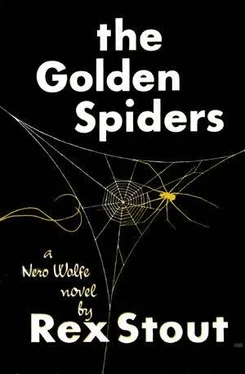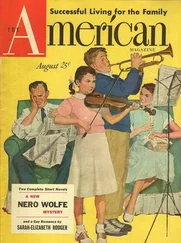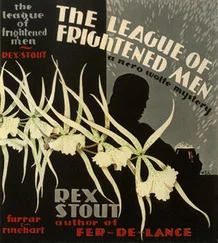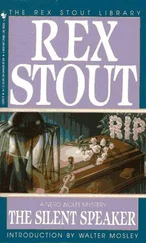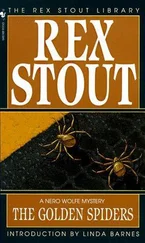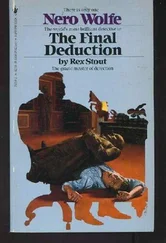I went to the hall to see the door close behind him and then returned to the office and my desk.
“The letter to Mr. Jordan,” Wolfe instructed me.
“Yes, sir.” I got my notebook. “First, though, I still say it was one in a million, but the one turned up this time. That was a woman on the phone about the ad. No name, and I didn’t want to press her with company present. She made an appointment for noon today.”
“With whom?”
“You.”
His lips tightened. He released them. “Archie. This is insufferable.”
“I know damn well it is. But considering that Cramer wasn’t being civilized, I thought it might be satisfactory to have a little chat with her before phoning him to come and get her.” I glanced up at the wall clock. “She’ll be here in twenty minutes — if she comes.”
He grunted. “‘Dear Mr. Jordan...’”
She came. She was much more ornamental in the red leather chair than Inspector Cramer, or, for that matter, most of the thousands of tenants I had seen in it, but she sure was nervous. At the door, after I opened it and invited her in, I thought she was going to turn and scoot, and so did she, but she finally made her legs take her over the sill and let me conduct her to the office.
The scratch on her left cheek, on a slant down toward the corner of her mouth, was faint but noticeable on her smooth fair skin, and it was no wonder that Pete, looking straight at her face, had taken in the spider earrings. I agreed with him that they were gold, and they were fully as noticeable as the scratch. In spite of the scratch and the earrings and the jerky nervousness, on her the red leather chair looked good. She was about my age, which was not ideal, but I have nothing against maturity if it isn’t overdone.
When Wolfe asked her, not too grumpily, what he could do for her, she opened her bag and got out two pieces of paper. The bag was of soft green suede, the same as the jacket she wore over a dark green woolen dress, and also the cocky little pancake tilted to one side of her head. It was an ensemble if I ever saw one.
“This,” she said, “is just a clipping of your advertisement.” She returned it to the bag. “This is a check made out to you for five hundred dollars.”
“May I see it, please?”
“I don’t — not yet. It has my name on it.”
“So I would guess.”
“I want to ask you — some things before I give you my name.”
“What things?”
“Well, I — about the boy. The boy I asked to get a cop.” Her voice wouldn’t have been bad at all, in fact I might have liked it, if it hadn’t been so jumpy. She was getting more nervous instead of less. “I want to see him. Will you arrange for me to see him? Or it would be — just give me his name and address. I think perhaps that would be enough for the five hundred dollars — I know you charge high. Or I might want — but first tell me that.”
Wolfe invariably kept his eyes, when they were open, directly at the person he was talking to, but it had struck me that he was giving this visitor a specially keen inspection. He turned to me. “Archie. Please look closely at the scratch on her cheek.”
I got up to obey. She had alternatives: sit and let me look, cover her face with her hands, or get up and go; but before she had time to choose I was there, bending over, with my eyes only a foot from her face.
She started to say something, then checked it as I straightened up and told Wolfe, “Made with something with a fine sharp point. It could have been a needle, but more likely a small scissors point.”
“When?”
“The best guess is today, but it could have been yesterday I suppose. Not possibly three days ago.” I stayed beside her.
“This is impudent!” she blurted. She left the chair. “I’m glad I didn’t tell you my name!” She couldn’t sweep out without sweeping through me.
“Nonsense.” Wolfe was curt. “You couldn’t possibly have imposed on me, even without the evidence of the scratch, unless you had been superlatively coached. Describe the boy. Describe the other occupants of the car. What time did it happen? What did the boy say? Exactly what did he do? And so on. As for your name, that is no longer in your discretion. Mr. Goodwin takes your bag, by force if necessary, and examines its contents. If you complain, we are two to one. Sit down, madam.”
“This is contemptible!”
“No. It’s our justifiable reaction to your attempt to humbug us. You are not under duress, but if you go you leave your name behind. Sit down and we’ll discuss it, but first the name.”
She may have been over-optimistic to think she could breeze into Nero Wolfe’s office and fool him, but she wasn’t a fool. She stood surveying the situation, all signs of nervousness gone, came to a conclusion, opened her bag, and got out an object which she displayed to Wolfe. “My driving license.”
He took it and gave it a look and handed it back to her, and she seated herself. “I’m Laura Fromm,” she said, “Mrs. Damon Fromm. I am a widow. My New York residence is at Seven-forty-three East Sixty-eighth Street. Tuesday, driving a car on Thirty-fifth Street, I told a boy to get a cop. I gathered from your advertisement that you can direct me to the boy, and I will pay you for it.”
“So you don’t admit this is an imposture.”
“Certainly not.”
“What time of day was it?”
“That’s not important.”
“What was the boy doing when you spoke to him?”
“Neither is that.”
“How far away was the boy when you spoke to him, and how loudly did you shout?”
She shook her head. “I’m not going to answer any questions about it. Why should I?”
“But you maintain that you were driving the car and told the boy to get a cop?”
“Yes.”
“Then you’re in a pickle. The police want to question you about a murder. On Wednesday a car ran over the boy and killed him. Intentionally.”
She gawked. “What?”
“It was the same car. The one you were driving Tuesday when the boy spoke to you.”
She opened her mouth and closed it. Then she got words out. “I don’t believe it.”
“You will. The police will explain to you how they know it was the same car. There’s no question about it, Mrs. Fromm.”
“I mean the whole thing — you’re making it up. This is — worse than contemptible.”
Wolfe’s head moved. “Archie, get yesterday’s Times .”
I went for it to the shelf where the papers are kept until they’re a week old. Opening it to page eight and folding it, I crossed and handed it to Laura Fromm. Her hand was shaking a little as she took it, and to steady it while she read she called on the other hand to help hold it.
She took plenty of time for the reading. When her eyes lifted, Wolfe said, “There is nothing there to indicate that Peter Drossos was the boy you had accosted on Tuesday, but you don’t need to take my word for that. The police will tell you about it.”
Her eyes darted back and forth, from Wolfe to me and back again, and then settled on me. “I want — could I have some gin?”
She had let the newspaper drop to the floor. I picked it up and asked, “Straight?”
“That will do. Or a Gibson?”
“Onion?”
“No. No, thank you. But double?”
I went to the kitchen for the ingredients and ice. As I stirred I was thinking that if she was hoping for any cooperation from Wolfe it was too bad she had asked for gin, since in his book all gin drinkers were barbarians. That was probably why, when I took the tray in and put it on the little table beside her chair, he was leaning back with his eyes closed. I poured and served. First she swigged it, then had a few sips, and then swigged again. Meanwhile she kept her eyes lowered, presumably to keep me from looking in through them to watch her mind work.
Читать дальше
